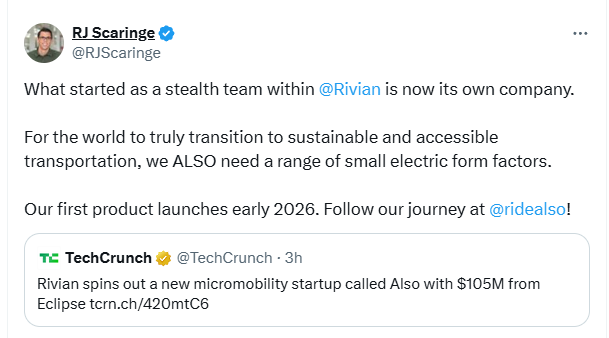Rivian Spins Out Micromobility Division, Launches New Brand "ALSO" Focused on E-Bikes; Reveal Set for 2025, Launch in 2026
March 26, 2025

RJ Scaringe's announcement of the ALSO brand on X (formerly Twitter)
TL;DR:
- Rivian has launched ALSO, a new, separate brand spun out from an internal project, to focus on micromobility (likely starting with e-bikes).
- CEO RJ Scaringe confirmed the first product will be revealed later this year (2025) and launch in 2026.
- Rivian will hold a minority stake in ALSO, with Scaringe serving on its board.
- This spin-off structure likely helps ALSO secure its own funding, maintain focus, and build a distinct brand, while allowing Rivian to concentrate on its core truck/SUV business.
Rivian Automotive, Inc. is venturing beyond electric trucks and SUVs with the launch of a new, separate brand named "ALSO," dedicated to producing "small electric form factors," the company confirmed today. The announcement, highlighted by Rivian CEO RJ Scaringe on social media and detailed in reporting by TechCrunch, marks the formal spin-off of a previously internal Rivian project focused on the burgeoning micromobility market.
Industry watchers anticipate ALSO's initial focus will be on electric bicycles (e-bikes), potentially followed by scooters and other compact electric vehicles. This aligns with a report from Engadget nearly two years ago which first surfaced rumors of Rivian developing an e-bike. Scaringe himself seemed to subtly preview the news the evening prior, sharing a video on Instagram of him cycling with his niece.
In an interview with TechCrunch discussing the new venture, Scaringe provided a tantalizing glimpse into ALSO's first product, describing it cryptically as having "a seat...two wheels...a screen...and a few computers and a battery." This description strongly points towards an advanced e-bike offering. Crucially, Scaringe confirmed in the interview that this first product is slated for a public reveal later this year (2025), with a market launch planned for 2026. The full TechCrunch interview can be found here.
The new company, ALSO, will operate with a degree of independence. According to the TechCrunch report, Scaringe will serve on ALSO's board of directors, ensuring continued strategic alignment, while Rivian itself will maintain a minority ownership stake in the brand. This structure suggests a strategic move to allow ALSO access to dedicated funding and operational focus outside of Rivian's core automotive manufacturing efforts.
This spin-off strategy is likely driven by several factors. Developing and launching an entirely new product category like e-bikes requires significant capital investment and specialized focus. By establishing ALSO as a separate entity, the venture can potentially attract its own funding from investors specifically interested in the high-growth micromobility sector. This approach also shields Rivian's primary balance sheet and allows the core company to maintain focus on scaling production of its R1T, R1S, and commercial van platforms – a key priority given the market pressure on its stock price since its initial public offering (IPO). Launching a potentially capital-intensive, initially loss-making segment directly under the main Rivian banner might have been met with concern from automotive investors.
Furthermore, creating a distinct brand allows ALSO to cultivate its own identity tailored to the micromobility consumer, potentially differing from Rivian's established premium adventure vehicle image.
The establishment of ALSO could signal a broader strategy for Rivian, potentially setting a precedent for incubating and spinning out other innovative projects that fall outside its main vehicle lines. While purely speculative at this point, one could envision future ventures focused on areas like Rivian-specific charging solutions, connected services, or even specialized vehicle applications – perhaps the RV buildouts on electric commercial vehicle (ECV) platforms – potentially following a similar path if they reach sufficient scale and require unique market positioning or funding structures.
The launch of ALSO positions Rivian to compete in the rapidly expanding urban and recreational micromobility space, leveraging its expertise in electric powertrains, battery technology, and connected software in a new market segment. The industry will be watching closely as ALSO unveils its first products later this year and carves out its niche.
Michael McCartney